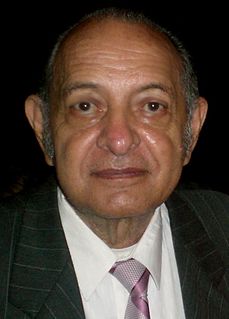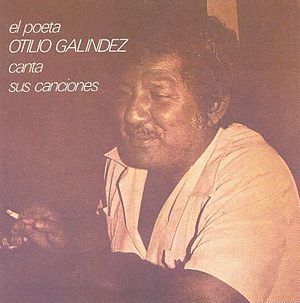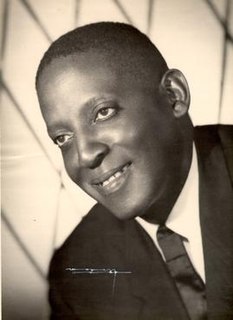
Several styles of the traditional music of Venezuela, such as salsa and merengue, are common to its Caribbean neighbors. Perhaps the most typical Venezuelan music is joropo, a rural form which originated in the llanos, or plains.

Pablo Milanés Arias is a Cuban singer-songwriter and guitar player. He is one of the founders of the Cuban nueva trova, along with Silvio Rodríguez and Noel Nicola. His music, originating in the Trova, Son and other traditional styles of early 20th Century Cuban music, set him apart from the style of Silvio Rodríguez.

Hugo Blanco was a popular Venezuelan musician. He is best known as the author of "Moliendo Café" and other songs like "El Burrito Sabanero", "Leche Condensada", "Luces de Caracas", "Sierra Nevada" and "Mañanita Zuliana". "Moliendo Café", written in 1958 when Hugo Blanco was only 18 years old, has become one of the most recognized Venezuelan songs in the world.

Alberto Naranjo [nah-rahn'-ho] was a Venezuelan musician. His mother, the singer Graciela Naranjo, was a radio, film and television pioneer in her homeland. Largely self-taught, Naranjo embarked on a similar musical course, becoming – like his mother – one of Venezuela's icons of contemporary popular music.

Otilio Galíndez was a Venezuelan songwriter and musician. He is best known for his Christmas songs (aguinaldos) like "La Restinga", even though he also composed popular Venezuelan waltzes, serenades, bambucos or joropos such as "Pueblos tristes", "Flor de mayo" and "Mi tripón". Many of his songs have been recorded by María Teresa Chacín, Ilan Chester, Simón Díaz, Pablo Milanés, Silvio Rodríguez, Mercedes Sosa, Cecilia Todd and Lilia Vera, among others.
El Diablo Suelto, published originally in 1888, is one of the most renowned songs in Venezuela's music history. Composed by Heraclio Fernández, this popular waltz created in the western state of Zulia is played as a joropo, as it forms part of Venezuelan folk culture.

Duetos de leyenda, is a Venezuelan music album released in 1999, by Magdalena Sánchez with the seal Studio Yamila Oropeza, presenting duets, with famous Venezuelan folk singers.

Imagen Latina is an album by Venezuelan musician Alberto Naranjo, originally released in 1992 and reedited thrice in 2002, 2008 and 2012. It is the seventh album of El Trabuco Venezolano musical project arranged and directed by Naranjo.

Tania Libertad de Souza Zúñiga known professionally as Tania Libertad, is a Peruvian-Mexican singer in the World Music genre.

Guadalupe Pineda is a Mexican singer considered one of Mexico's grassroots musical icons. She is a recipient of the Latin Grammy Lifetime Achievement Award and a multi-Latin Grammy nominee, she has released more than 30 albums during her career covering various styles of music with sales over 10 million copies worldwide. In 1984, she recorded her breakthrough hit "Yolanda", also known as "Te Amo", composed by Pablo Milanes, selling more than 1.5 million copies. She primarily sings in Spanish but has also sung in French, Italian, English, and Hebrew. She has been called the “Queen of Bolero”, but has also sung ballads, mariachi, tango, ranchera, and opera. Pineda has performed all over Mexico and in various countries in Europe and the Americas. She's been worthy of innumerable recognition, awards, and special mentions from the critics, proving through 45 years of career that quality and purity of music are not opposed to the popular approval.
Pablo Manavello was an Italian-born Venezuelan composer, guitarist, singer and songwriter.

Liuba María Hevia is a singer and composer from Cuba. She has released several CDs, toured internationally, and collaborated with various artists.

Barbarito Díez was a Cuban singer who specialized in danzón. He began his career as the singer for Graciano Gómez and Isaac Oviedo's son group, before joining Antonio María Romeu's orchestra. As the lead vocalist for Romeu's ensemble for 20 years, he established himself as one of the main exponents of the sung danzón. He continued singing with his own charanga, as well as other groups, for another 30 years. He also toured and recorded in Venezuela and Puerto Rico before retiring in the early 1990s, when complications from diabetes prevented him from performing and eventually resulted in his death in 1995. A naturally-gifted tenor, he was known for his sense of rhythm, correct diction and romantic style.
Los Cuñaos[coo-nyah'-os] is an eight-part vocal group established in Caracas, Venezuela in 1974. Their repertoire is based on popular Venezuelan songs adapted to their own unique style of singing, performing a crossover of traditional and pop genres while contrasting their work with rich and warm harmonies.

Yordano, born Giordano Di Marzo Migani, is an Italian–born Venezuelan singer-songwriter and guitar player.
Silvano Monasterios is a Venezuelan jazz musician, pianist, composer and orchestrator.

Eugenia León is a Mexican singer. In 1985, she won first place at the prestigious OTI Festival in Seville, Spain with the theme "El Fandango Aquí" by Marcial Alejandro. A winner of the Latin Grammy Lifetime Achievement Award, she has had a career spanning more than 35 years and 26 recorded albums, of which several million copies have been sold. She has performed in some of the most important venues in Mexico, such as the Palacio de Bellas Artes, the Auditorio Nacional, the Sala Nezahualcóyotl, the Teatro de la Ciudadd, and the Cervantino Festival.
Frank Quintero is a Venezuelan singer-songwriter, guitarist and drummer specialized in pop music.
Alexis Rossell is a Venezuelan fusion harpist and folk musician born on March 3, 1951 in Coro, Falcón. He is brother of the late Venezuelan theater director Levy Rossell. He graduated from the Juan José Landaeta National Conservatory of Music in Caracas. Rosell fuses typical Venezuelan music and instruments with elements of rock music.
The term fulía refers to a variety of folk genres in Venezuela generally performed as part of the vigils of the Cruz de Mayo. Of these genres, there are two that are especially prominent: the fulía central and the fulía oriental or cumanesa.













